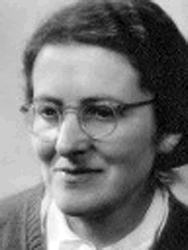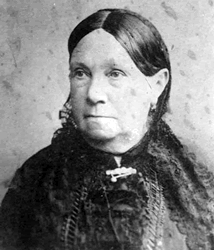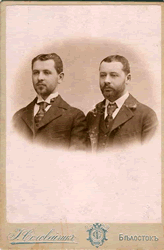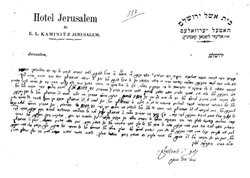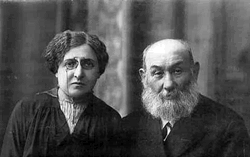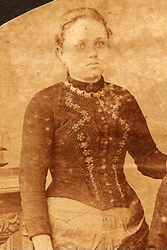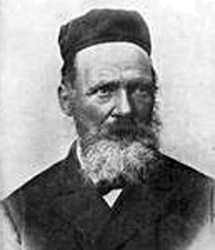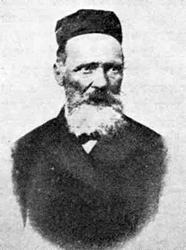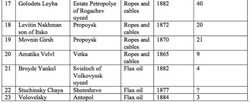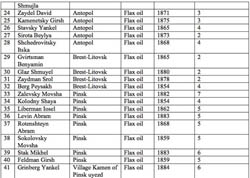#pns-1:
Ester Oren (born Pines)
MyHeritage Family Trees
Birth:
Oct 23 1905 - Ruzhany
Death:
July 15 1993 - Israel
Parents:
Yonah Pines, Dvora Pines
Sister:
Rosa Oren (born Pines)
Husband:
Menachem (Mieczyslaw-mendel) Oren
Son:
Yona Oren
#pns-2:
Haya Tzipora Pines (Luria)
Place of Burial:
Belarus
Birth:
1844 Mohilov Belarus
Death:
1918 Jerusalem
Immediate Family:
Daughter of Shmaryahu Luria, of Mohilev and Hana Mina Luria
Wife of Yechiel Michael Pines
Mother of Yitta Yellin; Nechama Karlinski (Pines); Sarah Rachel Kalev and Margalit Meyuhas (Pines
Sister of Solomon-Zelman Lurie; Sarah Lurie; Feiga Zukerman; Henia Lurie and Ita Rivka Luria
#pns-3:
Hinde the Warschauerin, Ita Yellin's grandmother
The Warschauerin is the nickname of her grandmother referred to in Ita Yellin's memoir. ["My grandmother, uncles and aunts were called not by their own names but rather by the name of their towns. My grandmother was called "the Warsaw-ite"]
The Pines Family
Compiled by Lisa Newman
Canada April 2004
#pns-4:
Hersh and Elje Pines, sons of Mordecai and Riva Pines and brothers of Golda Pines
The Pines Family
Compiled by Lisa Newman
Canada April 2004
#pns-5:
A document signed by Yichiel Michel Pines, found in the Central Zionist Archives
#pns-6:
Mordecai Iser Pines [1836-1927] and his wife Rivka, nee Zeldovich, who lived in the Ruzhany castle. Their children were Esther, Meir Dovid, Yona, Tanya, Hirsh, Else and Golda. Mordecai ran the Pines textile mills, along with other Pines relatives.
The Pines Family
Compiled by Lisa Newman
Canada April 2004
#pns-7:
Margalit Pines Daughter of Yechiel Michael Pines and Tzipa Pines
Wife of Yossef Meyuhas
Mother of Rachel Feigenbaum; Yedida Ayala Felsenthal; Hana Polani; Yael Levi and Shulamit Sorsky
Sister of Yitta Yellin; Nechama Karlinski (Pines) and Sarah Rachel Kalev
#pns-8:
Yechiel Michael Pines
Place of Burial:
Jerusalem
Birth:
October 17, 1843
Ruzhany, Grodno
Death:
March 15, 1913
Jaffa ???,
Immediate Family:
Son of Noah - Pines and Hinda Hinde Pines
Husband of Tzipa Pines and ??? Pines
Father of Yitta Yellin; Nechama Karlinski (Pines); Sarah Rachel Kalev and Margalit Meyuhas (Pines
Brother of Zeev Wolf Jawitz; Fishel Pines; Yerucham Fischel Pines; Golda Jawitz Yaabetz Sussman and Tsivia Friedland
#pns-9:
Rachel Davidson
Brothers; Yechiel Michel Pines and Fishel Pines.
http://www.jewishgen.org/yizkor/ruzhany/ruz077.html
Fishel Pines
Fishel Pines was one of the 35 delegates to the Chibat Zion convention in Katowice in 5645 (1844). Thus did tiny Ruzhany succeed in entering into a list along with big cities such as Warsaw, Bialystock, Odessa, Riga, and the likes, which sent delegates to this convention.
When Fishel Pines returned home, he would preach about Zion and Jerusalem every Sabbath in the synagogue. On weekdays, he would work to arrange collections for Chibat Zion, and he would donate no small amount himself. We later find Fishel Pines among the delegates to the second convention of the Zionists of Russia that took place in Minsk on 2-8 Elul 5662 (1902).
He continued with his Zionist activity until ties were cut off with the world at the outbreak of the First World War. Fishel Pines died during this war, in 5678 (1918). Ruzhany had then been under German occupation for 3 ½ years. “Hatzefira” number 23 (a weekly published in Warsaw) notes the following about his death:
“In Ruzhany, Reb Fishel Pines passed away. He was the brother of the scholar Rabbi Yechiel Michel Pines of Jerusalem. Reb Fishel Pines was one of the first members of Chovevei Zion, and among the faithful to the idea of national revival. During his brilliant speeches, he would attract many followers to the Zionist idea. He was a scholar from the old Beis Midrash, with deep knowledge of Talmud and Midrashim. He also read a great deal of general literature. He was wealthy and lived comfortably for all his life, but the war took everything from him and also distanced him from his children who were living in Russia. This excellent man lived alone and forlorn in his native city during his last year. May his soul be bound in the bonds of eternal life.”
David Noach Pines
The son of Reb Fishel followed the path of his father, and was an enthusiastic Zionist. He would gather the people of the town in the synagogue and preach to them about the settlement of the Land. His mouth would emit flames.
Fishel's brother decided to actualize Chibat Zion (the love of Zion) in deeds. He made aliya in the year 5638 (1878) and was one of the first builders of the new settlement. The next chapter is about him.
Yechiel Michel Pines was born on the 23rd of Tishrei 5604 (1843) in our town Ruzhany, in the Grodno District. In his time, he became famous in the Zionist world as a central figure in the Diaspora and later in the Land. He received a Jewish and general education, and excelled in his talents already during his youth. He was among the influential people already in cheder and Yeshiva. His rabbi, Rabbi Mordechai Gimpel Yaffa, prophesied a future for him. Indeed
this was not for naught, for he later became famous as a man of Torah and a maskil blended together, and an enthusiastic lover of Zion, graced with a fine Hebrew style and abilities in publicity. In his articles in “Hakarmel” and “Halevanon” he fought against the demands of the maskilim for revisions to religion, and against the assimilationists and the Reform. His sharp articles, imbued with love of Israel and reverence for the eternal values of Jewish religion and tradition, were collected in a two volume book called “Yelidei Ruchi” that was published in the year 5632 (1872).
YEHIEL MICHAEl PINES
PINES, YEHIEL MICHAEL ("Michal"; 1843–1913), writer, early exponent of religious Zionism, and yishuv leader. Born in Ruzhany, Belorussia, into a family of prosperous merchants and Torah scholars, Pines was influenced in his youth by Mordecai Gimpel *Jaffe, an early leader of *?ovevei Zion, who headed a yeshivah maintained by Pines' family. He studied both traditional subjects and foreign languages and science, and the fusion of the two spheres of knowledge led to a romantic-religious outlook. Pines believed that Jewish life should be reformed, but he was opposed to deliberate, religious reforms that would undermine the foundations of tradition and increase assimilation. He thought that a reformed way of life would inevitably bring about certain changes of halakhah without affecting the sanctity of the Jewish religion. During the 1860s Pines developed these ideas in his controversy with M.L. *Lilienblum, *J.L. Gordon, and others, mainly through his articles in *Ha-Karmel, *Ha-Meli?, and *Ha-Levanon. The articles were collected in his book, Yaldei Ru?i ("Children of My Spirit," 2 vols., 1872), and his ideas were later expanded by *A?ad Ha-Am, who restyled them in his own clear, polished language.
In 1877, while he was living at his father-in-law's home in Mogilev, Pines was asked by the Moses Montefiore Testimonial Fund in London to serve as its representative in Ere? Israel. He accepted eagerly, reached Jaffa a year later, and settled in Jerusalem (1878) at the home of his relative, Yosef *Rivlin, the secretary of the Va'ad Kelali (General Committee of the *?alukkah), thus arousing the enmity of Rivlin's many opponents in Jerusalem (?asidim and maskilim, Sephardim, and religious extremists; the latter, supporters of Rabbi Y.L. *Diskin persecuted Pines and proclaimed him "excommunicated").
On behalf of his London sponsors, Pines conducted investigations into the spiritual, cultural, and particularly the economic problems of the yishuv, proposing the founding of an agricultural settlement, the building of houses and new quarters, and the establishment of artisan and industrial projects. The Montefiore Fund concentrated on granting aid for the construction of houses and Jerusalem was thus expanded through the building of several new quarters. Pines' letters to the Fund trustees appear in volumes 2 and 3 of Miv?ar Kitvei Y.M. Pines ("Selected Writings of Y.M. Pines") and in his Binyan ha-Are? ("Building of the Land"), volumes 1 and 2 (1934).
Pines tried to set up artisan and industrial projects with the help of Montefiore Fund loans, and with his own money as well, but they proved a failure and brought about his dismissal in 1885. (His son-in-law, David Yellin, was appointed to the same post in 1901.) In 1882 Pines became friendly with Eliezer *Ben-Yehuda who had just arrived in Ere? Israel, and together they established the Te?iyyat Israel ("Israel Renaissance") Society, whose aim was, inter alia, to introduce Hebrew as a spoken language. When the first members of *Bilu arrived at the end of the same year, Pines became their patron and established the Shivat he-?arash ve-ha-Masger ("Return of the Craftsmen and the Smiths") Society for them in Jerusalem. With ?ovevei Zion funds he bought for them the lands for the settlement of *Gederah in 1884 and was the settlement's patron for several years. In 1885 K.Z. *Wissotzky appointed him a member of the executive committee of ?ovevei Zion in Palestine. For several months in 1886 he edited Ha-Zevi, Ben-Yehuda's newspaper, while the latter was abroad, but the friendship between the two was affected by the outbreak of the violent controversy regarding the Sabbatical Year (shemittah), which fell in 1888/89. Although Pines' conservative attitude to this question aroused opposition in Hovevei Zion circles, he was elected in 1890 to the organization's executive committee in Jaffa, headed by Vladimir *Tiomkin. At about the same time Pines joined the *Benei Moshe Society, but its leader A?ad Ha-Am, who wanted to prevent discussions of religious problems in the Society, advocated his departure from that group. In 1892, after a crisis in the activities of the executive committee of ?ovevei Zion, Pines was dismissed and thereafter affiliated himself with the old yishuv, even becoming one of its main spokesmen. His views on nation and religion, which he then developed in his articles in *Ha-?ava??elet and in special pamphlets, were shortly afterward adopted by the *Mizrachi Party. In 1893 he became a trustee of the Ashkenazi community's charitable institutions in Jerusalem, and the librarian and a teacher of Talmud in the Hebrew Teachers' college.
Pines was foremost a thinker, writer, and craftsman of Hebrew language and style. He displayed outstanding knowledge of biblical style and language (into which he translated various scientific books) and greatly influenced his brother-in-law and pupil, Ze'ev *Jawitz, who in turn influenced ?.N. *Bialik. Pines was conversant with mishnaic style (see his Mishnat Ere? Yisrael), the medieval style rhyming prose, and the conglomerate style that he employed in his articles and his many letters to employers and to people who approached him with queries regarding settlement in Ere? Israel. Yaldei Ruhi and some of his letters and articles appeared in the three volumes of Kitvei Y.M. Pines ("Writings of Y.M. Pines," 1934–39), edited by his sons-in-law, David Yellin andYosef *Meyuhas. His selected writings, Mivhar Kitvei Pines, appeared in 1946, edited and with a preface by G. Kressel. Kefar Pines, a moshav in the Sharon Plain, is named for him.
BIBLIOGRAPHY:
N. Sokolow, ?ibbath Zion (Eng., 1935), index; A. Boehm, Die zionistische Bewegung (1935), index; G. Raphael, Rabbi Ye?i'el Mikha'el Pines (1954); M. Michaeli, Rabbi Ye?i'el Mikhal Pines (1928); A. Druyanow (ed.), Ketavim le-Toledot ?ibbat ?iyyon ve-Yishuv Ere? Yisrael, 1 (1919), index; 3 (1932), index; ?.N. Bialik, in: Ha-Olam, 7 no. 13/14 (1913), 23–25; I. Yellin, Le-?e'e?a'ai, 2, vols. (1938–41), passim; Y. Nissenbaum, Ha-Dat ve-ha-Te?iyyah ha-Le'ummit (1920), 145–51.
[Galia Yardeni-Agmon]
1887 – Jewish owners of linen-processing factories in Belarus
Posted on December 15, 2015by jhrgbelarus
By the mid-19th century, Russia had become the largest country exporting linen to Europe. It was used for in the production of fabric, oil, cords and cables. It became one of the fastest-growing industries in Russia.
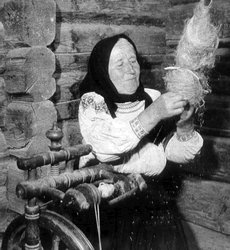
Process of creating linen threads in the early 20th century
Some wealthy Jews were investing in linen processing factories, most of which were in northwest Russia, including today’s Belarus.
By the end of the 19th-century, in the territory that’s now known as Belarus, had some 70 linen-processing factories; 41 were Jewsh-owned.
Here is the 1887 list of Jewish owners of linen-processing factories in Belarus:
